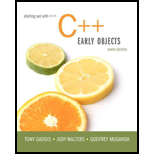
Starting Out with C++: Early Objects (9th Edition)
9th Edition
ISBN: 9780134400242
Author: Tony Gaddis, Judy Walters, Godfrey Muganda
Publisher: PEARSON
expand_more
expand_more
format_list_bulleted
Question
Chapter 18, Problem 6PC
Program Plan Intro
Dynamic String Queue
Program Plan:
- Include the required header files.
- Declare a class Dynque that creates a queue and store all the elements in the queue.
- Declare all the variables present in the class.
- Declare the front and rear pointers and the number of items.
- Create a constructor to allocate elements in queue.
- Create a destructor to deallocate elements in queue.
- Create a function void Dynque<T>::enqueue(T val)that inserts the value in the variable val at the rear end of queue.
- Create a function void Dynque<T>::dequeue(T &val)that removes the value at the front of the queue, and copies it into val.
- Create a boolean function to check if queue is empty and a function clear to dequeue all elements present in the queue.
- Declare the main function.
- Prompt the user to enqueue 5 strings into the queue.
- Dequeue and retrieve all items present in the queue.
Expert Solution & Answer
Want to see the full answer?
Check out a sample textbook solution
Students have asked these similar questions
Information Security Risk and Vulnerability Assessment
1- Which TCP/IP protocol is used to convert the IP address to the Mac address? Explain 2-What popular switch feature allows you to create communication boundaries between systems connected to the switch3- what types of vulnerability directly related to the programmer of the software?4- Who ensures the entity implements appropriate security controls to protect an asset?
Please do not use AI and add refrence
Find the voltage V0 across the 4K resistor using the mesh method or nodal analysis. Note: I have already simulated it and the value it should give is -1.714V
Resolver por superposicion
Chapter 18 Solutions
Starting Out with C++: Early Objects (9th Edition)
Ch. 18.3 - Describe what LIFO means.Ch. 18.3 - What is the difference between static and dynamic...Ch. 18.3 - What are the two primary stack operations?...Ch. 18.3 - What STL types does the STL stack container adapt?Ch. 18 - Prob. 1RQECh. 18 - Prob. 2RQECh. 18 - What is the difference between a static stack and...Ch. 18 - Prob. 4RQECh. 18 - The STL stack is considered a container adapter....Ch. 18 - What types may the STL stack be based on? By...
Ch. 18 - Prob. 7RQECh. 18 - Prob. 8RQECh. 18 - Prob. 9RQECh. 18 - Prob. 10RQECh. 18 - Prob. 11RQECh. 18 - Prob. 12RQECh. 18 - Prob. 13RQECh. 18 - Prob. 14RQECh. 18 - Prob. 15RQECh. 18 - Prob. 16RQECh. 18 - Prob. 17RQECh. 18 - Prob. 18RQECh. 18 - Prob. 1PCCh. 18 - Prob. 2PCCh. 18 - Prob. 3PCCh. 18 - Prob. 4PCCh. 18 - Prob. 5PCCh. 18 - Prob. 6PCCh. 18 - Prob. 7PCCh. 18 - Prob. 8PCCh. 18 - Prob. 9PCCh. 18 - Prob. 10PCCh. 18 - Prob. 11PCCh. 18 - Prob. 12PCCh. 18 - Prob. 13PCCh. 18 - Prob. 14PCCh. 18 - Prob. 15PC
Knowledge Booster
Similar questions
- Describe three (3) Multiplexing techniques common for fiber optic linksarrow_forwardCould you help me to know features of the following concepts: - commercial CA - memory integrity - WMI filterarrow_forwardBriefly describe the issues involved in using ATM technology in Local Area Networksarrow_forward
- For this question you will perform two levels of quicksort on an array containing these numbers: 59 41 61 73 43 57 50 13 96 88 42 77 27 95 32 89 In the first blank, enter the array contents after the top level partition. In the second blank, enter the array contents after one more partition of the left-hand subarray resulting from the first partition. In the third blank, enter the array contents after one more partition of the right-hand subarray resulting from the first partition. Print the numbers with a single space between them. Use the algorithm we covered in class, in which the first element of the subarray is the partition value. Question 1 options: Blank # 1 Blank # 2 Blank # 3arrow_forward1. Transform the E-R diagram into a set of relations. Country_of Agent ID Agent H Holds Is_Reponsible_for Consignment Number $ Value May Contain Consignment Transports Container Destination Ф R Goes Off Container Number Size Vessel Voyage Registry Vessel ID Voyage_ID Tonnagearrow_forwardI want to solve 13.2 using matlab please helparrow_forward
- a) Show a possible trace of the OSPF algorithm for computing the routing table in Router 2 forthis network.b) Show the messages used by RIP to compute routing tables.arrow_forwardusing r language to answer question 4 Question 4: Obtain a 95% standard normal bootstrap confidence interval, a 95% basic bootstrap confidence interval, and a percentile confidence interval for the ρb12 in Question 3.arrow_forwardusing r language to answer question 4. Question 4: Obtain a 95% standard normal bootstrap confidence interval, a 95% basic bootstrap confidence interval, and a percentile confidence interval for the ρb12 in Question 3.arrow_forward
arrow_back_ios
SEE MORE QUESTIONS
arrow_forward_ios
Recommended textbooks for you
- Programming Logic & Design ComprehensiveComputer ScienceISBN:9781337669405Author:FARRELLPublisher:Cengage
 C++ Programming: From Problem Analysis to Program...Computer ScienceISBN:9781337102087Author:D. S. MalikPublisher:Cengage Learning
C++ Programming: From Problem Analysis to Program...Computer ScienceISBN:9781337102087Author:D. S. MalikPublisher:Cengage Learning  EBK JAVA PROGRAMMINGComputer ScienceISBN:9781337671385Author:FARRELLPublisher:CENGAGE LEARNING - CONSIGNMENT
EBK JAVA PROGRAMMINGComputer ScienceISBN:9781337671385Author:FARRELLPublisher:CENGAGE LEARNING - CONSIGNMENT Systems ArchitectureComputer ScienceISBN:9781305080195Author:Stephen D. BurdPublisher:Cengage Learning
Systems ArchitectureComputer ScienceISBN:9781305080195Author:Stephen D. BurdPublisher:Cengage Learning Microsoft Visual C#Computer ScienceISBN:9781337102100Author:Joyce, Farrell.Publisher:Cengage Learning,
Microsoft Visual C#Computer ScienceISBN:9781337102100Author:Joyce, Farrell.Publisher:Cengage Learning,

Programming Logic & Design Comprehensive
Computer Science
ISBN:9781337669405
Author:FARRELL
Publisher:Cengage


C++ Programming: From Problem Analysis to Program...
Computer Science
ISBN:9781337102087
Author:D. S. Malik
Publisher:Cengage Learning

EBK JAVA PROGRAMMING
Computer Science
ISBN:9781337671385
Author:FARRELL
Publisher:CENGAGE LEARNING - CONSIGNMENT

Systems Architecture
Computer Science
ISBN:9781305080195
Author:Stephen D. Burd
Publisher:Cengage Learning

Microsoft Visual C#
Computer Science
ISBN:9781337102100
Author:Joyce, Farrell.
Publisher:Cengage Learning,